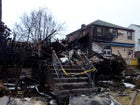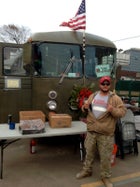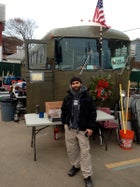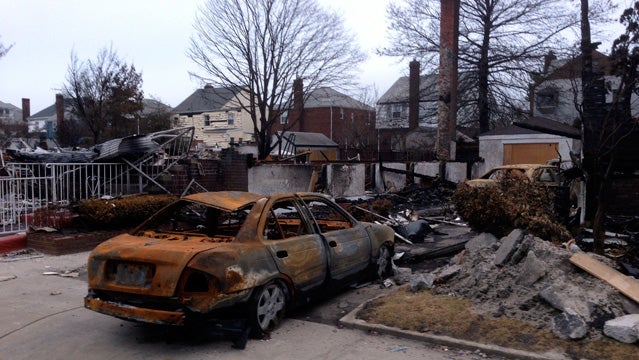The Bay came first. At around 6 p.m. on Monday, October 29, Kelly-Ann McMullan Preiss and her husband, Chuck, were having dinner with their three young children when Kelly-Ann looked out the window and saw water from Jamaica Bay flowing down her street. The Preisses live on Beach 131st Street, in the Belle Harbor section of the Rockaways, the narrow, working-class peninsula in Queens that separates the Atlantic Ocean from New York City. The couple had decided to stay in their house, a two-story wooden home built by Kelly Ann’s great-great grandfather in 1925, rather than evacuate during Hurricane Sandy.
 Beach 130th Street in Belle Harbor, Queens.
Beach 130th Street in Belle Harbor, Queens. Jake Kimmel.
Jake Kimmel. Shane Valverde.
Shane Valverde.Kelly-Ann was accustomed to disruption. In 2001, American Airlines flight 587 crash-landed on her block, killing 260 people aboard the plane and five on the ground and coming to a stop only five houses away from hers. At the time, she was six months pregnant with her first child, Daniel, a son from a previous relationship. Last fall, two years after they got married, the Preisses evacuated as state officials made grave warnings about Hurricane Irene, but the water levels were low and left the neighborhood largely unaffected. Looters were less forgiving, though, so this fall, as state officials issued mandatory evacuation orders for Sandy, Chuck, a 38-year-old fire-safety inspector for a Manhattan real estate company, did what most of his neighbors did: he stayed home. Kelly-Ann cooked chicken cutlets and pasta, they ate as a family, and then they settled in to watch television and ride out the storm.
Soon the rising bay met the rising ocean on the street in front of the house, and Chuck went downstairs to see if the basement was flooding. It was. One window broke, then another, and the water rushed in, three feet and rising in a matter of seconds, chasing him upstairs. He and Kelly-Ann grabbed their children, Daniel, 10, Brooke, 3, and Ashley, 2, and waded into the waist-deep seawater. They headed to the house of their next-door neighbor, Ed Weigert, a former Marine—the more hands around with the kids the better, Chuck figured. Soon after putting the kids to sleep, Chuck looked out the window and saw flames: the home three houses down the block was on fire. Weigert rushed out into the water and woke the sleeping residents, then helped them evacuate to another neighbor’s house.
Before long high winds started whipping embers the size of cantaloupes up the block and into Weigert’s house. They sounded, in Chuck’s words, “like hand grenades.” The water from Sandy came in the form of a tidal surge, not rain, so there was nothing to douse them.
“We were trying to keep the kids calm and not let them know how bad the fires really were,” says Kelly-Ann. “But they knew something was wrong. I remember pulling my husband to the hallway and telling him, ‘We are all going to die tonight.’”
With embers hitting Weigert’s house, the Preisses once again decided to move, this time with a growing group of neighborhood refugees. They ventured back into 131st Street, the men carrying the children toward a house on the west side of the road. Now the water was nearly neck high. Weigert took Daniel, Chuck took Brooke, and another neighbor took Ashley. Kelly-Ann stayed behind at Weigert’s, waiting for Chuck to come back for her. “They left,” she says, “and all I remember saying was, ‘Please don’t let go of my baby.’”
The neighbor didn’t, and soon all the Preisses were huddled in yet another house, their third of the evening, across the street from Weigert’s. This seemed safe, but only for a moment, because soon the street directly west of them, 130th, began to burn.
It’s unclear what started the fires on 130th, or why they moved with such great appetite while only one home on 131st Street went up. (The embers that struck Ed Weigert’s place never fully caught on.) But what is clear is that about a dozen homes on both sides of Beach 130th Street completely burned.
As the flames grew higher behind them, the Preisses decided to move yet again, back to the side of the street from which they’d come. A kayak floated by, someone grabbed it, and Chuck put his kids in and waded across, this time to the house on the northwest corner of the block.
Once the children were safe and dry Chuck, Ed, and another neighbor made a few trips back and forth, shuttling people in the kayak. Soon, about 30 people were huddled in a two-story home. An EMT truck came, but it got stuck in the water, and the emergency worker came to the second floor along with everyone else, waiting for the storm to subside while 100 feet away, 130th Street burned to the ground.
ONE MONTH LATER, CHUCK Preiss stood in his home, panting, sheetrock dust like gray snow in his brown buzz cut. He was mucking and gutting his house with a group of eight helpers: four college-age volunteers, a finance worker who lives in the Rockaways, two U.S. military veterans, and myself. There were huge piles of wood in the yard, the smell of mold enveloped the house, and Bruce Springsteen sang “The Promised Land” on a small radio. Chuck nodded at us, turned to his kitchen wall, and swung a hammer: crack. We wore face masks; he didn’t. “Thanks for coming,” he said. Crack.
Despite the scope of the devastation, miraculously, no one died in Belle Harbor that night. But even if your house doesn’t burn, six feet of seawater will leave a mark on the sort of wooden houses that line the densely populated streets of the Rockaways. One month after the fire, on Saturday, December 1, people were tearing out their interiors before the mold could fully set in, hoping to rebuild before winter arrived. Great piles of wood and sheetrock sat in front of just about every house, and construction workers and volunteers, some with hazmat suits, many without, roamed the streets. When we turned up Beach 131st Street and crossed Newport Avenue, where Flight 587 hit in 2001, I noticed nothing that would have suggested that an Airbus A300 had crashed here a decade ago. One block west, though, Beach 130th looked like the fresh sight of a crash, minus the plane. Half the block was simply not there. One house’s foundation, made of stone, bore a sign saying, “Live well, laugh often, love much.” The sign was intact, the home gone, and beyond it, stretching north up the block, was a long, low pile of charred wreckage.
Recovery efforts here were initially coordinated by a non-profit called Team Rubicon USA. Founded in 2010 by a couple of veterans who wanted to aid victims of the Haiti earthquake, Rubicon is an all-volunteer group of former active military personnel who now deploy at a moment’s notice to disaster zones. A few members arrived in the New York area before Sandy and assisted in at least one live rescue in the Rockaways. A week after the storm, there were about 160 Rubicon members here from across the country, basing out of the Brooklyn Boulders climbing gym and driving to the Rockaways by day in a biodiesel-fueled 1981 Crown Supercoach bus. At the helm was a wiry, gray-haired Navy vet named Gordon Soderberg, who helped found the non-profit Veterans Green Jobs and who once helped coordinate a George W. Bush impeachment tour from Northern California to Texas. There was room for only so many Rubicon volunteers at the gym and on the bus; the organization had turned hundreds away.
Now Rubicon was handing over clean-up operations to a couple of other non-profits, Conservation Corps and New York Cares. Only a few vets were still around, including Soderberg, who manned the bus at the group’s makeshift field base camp on Rockaway Beach Boulevard. He was planning to drive to Detroit, where he hoped to convert the bus to run on cooking grease.
Two other veterans had led our group of volunteers to the Preisses. One was Shane Valverde, a 38-year-old former Marine and Blackwater contractor from Texas. He spent 14 years in the military, 10 with the Marines and four with the Army Reserve, and he’d retired after surviving his “fourth or fifth” IED attack, which took place in Afghanistan’s Helmand province in 2005 and left him with a few fake vertebrae and a brain injury. He is about five foot five, trim and fit, and appeared to be half the size of the other Rubicon member at the Preisses. This was Jake Kimmel, a 24-year-old Montanan with arms the size of hams who served in the infantry in Iraq from 2006–10. Kimmel wore camo and wraparound shades. Valverde and Kimmel promptly began filling heavy-duty trash bags with sheetrock and dragging the heavy sacks out of the house.
“You can carry more, brother,” Kimmel said to Valverde, after throwing a bag as if it were a pillow, “if you put down your purse.”
“OH, MY GOD. OH, my God. Oh, my God!”
Kelly-Ann Preiss arrived at the home where she and her mother had both grown up and where a group of strangers were now tearing out the walls. She approached and hugged each of us as we emerged from the house carrying bags of sheetrock: “Thank you so much.” She spoke quickly and often, in a heavy New York accent. “There’s so much. I gotta help. Here, gimme that.” She took a shovel and scooped up some sheetrock. “Oh, my God, there’s just so much.”
“It’ll get better,” said Gary Rizzi, the Rockaway resident who works in financial commodities and looked to be in his late fifties or early sixties. He’d evacuated during Sandy was now staying at his office in Long Island, but he’d returned to volunteer every weekend since. He was clad head to toe in denim and wore a weary expression. He was angry at FEMA for being slow to respond in certain areas, though Preiss said the organization turned up within three days of the storm. Rizzi was also angry at the fast churn of the city. “People are already moving on,” he told me. He’d been volunteering down in Breezy Point, where more than 100 homes burned, and suggested that the rest of us do the same. “Habitat for Humanity’s down there,” he said. “If you wanna volunteer again, they’ll be down there for a long time.”
“Turn up the radio!” said Kelly-Ann. Fleetwood Mac was on. Someone offered Kelly-Ann a face mask. “I can’t wear that,” she said, “It makes me nauseous.” Then she shoveled up a load of sheetrock and scooped it into a trash bag with remarkable efficiency. Tearing out wet sheetrock and moldy wood is nasty work; the dust gets in your clothes and your lungs. It’s motivating, however, to muck and gut alongside people whose home was almost lost. It doesn’t hurt to have combat veterans on your side, either. Valverde and Kimmel took to the work with great enthusiasm, yelling at one another in voices that went to 11.
“What you got there, brother, a sack of potatoes?” yelled Valverde.
“I got a sack of chicken livers, brother!” yelled Kimmel, hauling out another bag. I had trouble placing the voice at first and then found it: mock Hulk Hogan. The Rubicon guys clearly relished the work. They were fast and organized and energized. Also very, very loud.
“It’s just a very comfortable setting for us,” said Valverde. “It’s exactly the kind of chaos you see on the battlefield: confusion, miscommunication, lack of resources, intensity. The tempo. That stuff that really bogs other organizations down is a plus for us. That’s one of our biggest strengths.”
The Rubicon members I met were transparent about the fact that doing demolition on homes in the Rockaways was not merely a philanthropic endeavor. The group’s slogan is “Bridge the Gap.”
“It’s a damn good thing for us,” said Kimmel. “Most of us have deployed. In the real world, I have these skills but nowhere to use them. This gives me hope that there’s a place to use the skills it took me so long to learn.” Besides, he said, “it gives us a chance to get into the action without getting shot at.”
Kimmel is hoping to get a full-time job with a relief organization like the Conservation Corps. Valverde coordinates Rubicon’s efforts in five states, volunteers with a Texas state disaster relief organization, and is pursuing a bachelor’s degree in disaster relief. Which is to say: mayhem, and the adrenalized worldview that comes with it, suits these guys. I was curious how hundreds of vets from across the country could simply leave their lives for months on end when the storm hit. Did they have jobs?
“Many of us are retired,” said Valverde. “Others have temporary jobs. Some just quit and came out here.”
He took a pickax and bashed in a wall. I took a break outside, then came back in and found one small girl’s shoe in a pile of sheetrock.
“Oh, my God. Oh, my God. Oh, my God,” came Kelly-Ann’s voice from across the house.
“Sounds like our honeymoon!” said Chuck.
IT WAS DONE BY three, the house mucked and gutted, a mass of wreckage out front that would soon be trucked off to Jacob Riis Park, where gulls circled over a pile of wood and sheetrock that steadily grew to the size of a small mountain. The Preisses were thrilled. They still had to treat the original flooring for mold, then use the funds that FEMA had allotted them to help rebuild the place. They were hoping to move back in by Christmas Eve, Kelly-Ann’s birthday. “I’m staying at my in-laws, and it’s driving me nuts,” she said.
Later I asked Chuck if he had any plans to leave the Rockaways. It was clear he didn’t. “You want to live by the beach, you gotta pay the price,” he said. “That’s the bottom line. The ocean takes what it wants. In this neighborhood, everyone love to surf, everyone loves to fish, everyone loves the ocean. Not many people are leaving. They’ll be back.”
Before leaving, Valverde had a favor to ask: Rubicon was in contention for a financial windfall given by Chase Bank at the American Giving Awards. “Go to Facebook and vote for Team Rubicon,” said Valverde.
“I already did,” said Chuck. “Four times, like in the presidential election.”
A week later, Rubicon would be awarded $125,000 by Chase, and not long after that, Valverde and Soderberg would receive rousing ovations while being honored at the Madison Square Garden 12/12/12 Hurricane Sandy benefit concert, appearing between sets by the likes of Eric Clapton and the Rolling Stones. Now, though, on December 1, it was time for a break. Before we knocked off for the day, Chuck had one more question. “Can you guys go help my neighbor Ed,” he asked. “He needs some furniture moved. And he saved my kid’s life.”


